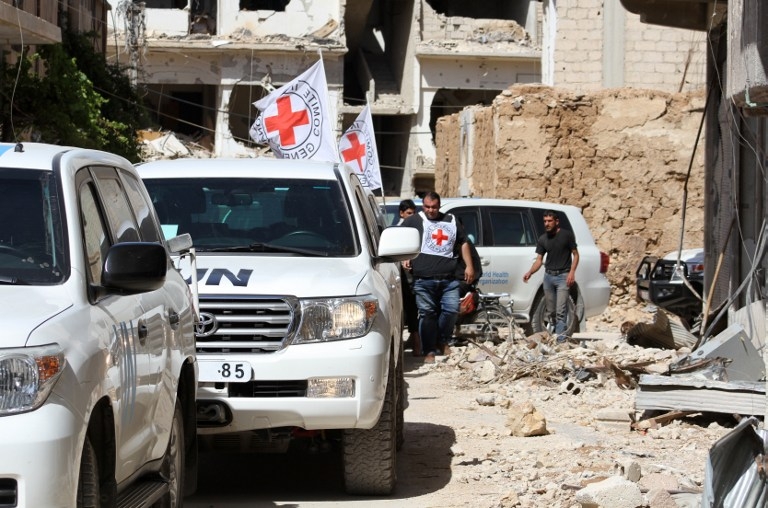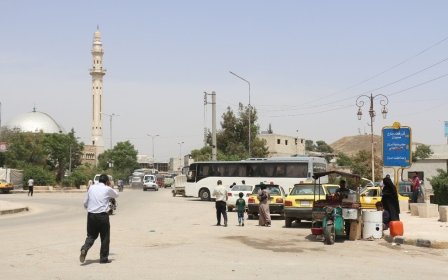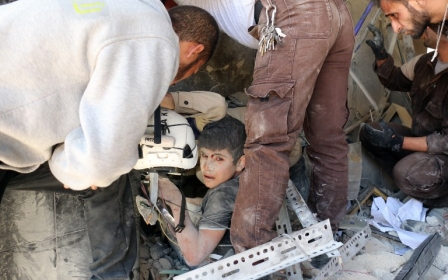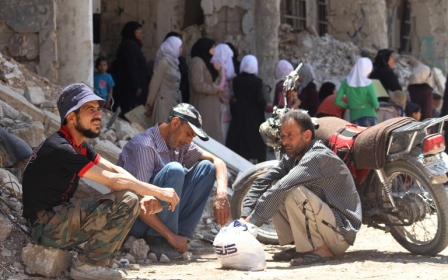Syrian government 'approves aid to 12 besieged areas': UN

Syria's government agreed on Friday to allow humanitarian aid to be delivered to 12 besieged areas during June, the United Nations said.
Damascus agreed to restricted aid deliveries to three more areas and rejected requests for two others, the UN office of humanitarian affairs (OCHA) said.
In a statement, Stephen O'Brien, the UN's under-secretary for humanitarian affairs, said that "people across Syria continue to face horrific deprivation and violence, especially those trapped in besieged areas.
"I remain extremely concerned for the welfare of people trapped in the towns of Marea and Sheikh Issa as ISIL [Islamic State group] forces advance; for the people in eastern Aleppo; and am appalled at the mortar attack on the Mseifra IDP camp in Daraa Governorate last weekend," O'Brien said after briefing the Security Council.
"I told the council that the operating space for humanitarian actors is shrinking as violence and attacks across Syria increase; and that recent attacks are creating new humanitarian emergencies and compounding the challenges in existing emergency areas."
OCHA has coordinated a number of deliveries to war-stricken areas in recent days in coordination with the Syrian Red Crescent.
O'Brien said that food for 45,000 people had been delivered earlier on Friday to Moadamiyeh in rural Damascus.
O'Brien also said that aid workers had entered Daraya on Wednesday for the first time in four years to find "a truly dismal situation" where people had "acute medical needs and clearly do not have enough food".
According to the UN, a total of 592,000 people live under siege in Syria - the majority surrounded by pro-government forces - and another 4 million live in hard-to-reach areas.
"We are slowly accessing more and more people – since January over 820,000 have had assistance, many of them more than once – but the progress, while encouraging, is far from enough," he said.
"During the month of May, we reached only two locations by land - East Harasta and Yarmouk - representing 20,000 people. This is only 3.4 percent of the total besieged population of 592,700."
Diplomats said ahead of Friday's closed session of the Security Council that the UN would on Sunday ask the Syrian government to allow it to begin air drops of food and medicine to besieged areas.
"What is at stake here is the necessity to put an end to a humanitarian disaster," French Ambassador Francois Delattre told reporters ahead of the meeting.
"The Syrian regime is continuing to systematically starve hundreds of thousands of civilians and use them as weapons of war. These are war crimes," said Delattre, who holds the council presidency this month.
The UN said on Thursday that helicopters would have to be used for air bridges to 15 of the 19 besieged areas because they are densely populated.
In addition to Daraya and Moadamiyeh, areas considered by the UN to be besieged by the Syrian government are Zabadani, Douma, Harasta and Zamalka, all in the region of Eastern Ghouta, as well as Rastan, one of the last rebel strongholds in Homs.
Foua and Kafraya, two Shia towns in Idlib province, are considered besieged by rebel forces, while Deir Ezzor in eastern Syria is considered besieged by the Islamic State group, and has already been targeted with air drops.
Meanwhile, dozens of civilians were reported killed in rebel-held areas of the northern city of Aleppo on Friday in some of the heaviest government air strikes in weeks.
At least 10 people died when a bus in which they were travelling was struck by a bomb on the main Castello road out of the city, civil defence workers told the AFP news agency.
At least 28 other civilians were killed in air strikes on several neighbourhoods, according to civil defence workers.
"There are people under the rubble and we're still looking for the missing," a civil defence volunteer who gave his name as Khaled said.
The state-run SANA news agency said rebel rocket fire had killed two children in the government-controlled west of the city.
The UK-based Syrian Observatory for Human Rights said the Castello road, the main route into the rebel-held eastern neighbourhoods, was now "effectively cut".
"All movement is targeted, be that buses or bystanders," Observatory head Rami Abdel Rahman said.
Also on Friday, the US military said that Syrian rebels advancing on IS group fighters in the strategic northern city of Manbij have seized more than 40 square miles (100 square kilometers) this week.
US Central Command spokesman Colonel Patrick Ryder said that more than 55 air strikes have been conducted since the offensive began on Monday, and that the rebel forces had secured areas on the western bank of the Euphrates River.
"They are facing some heavy resistance from ISIL, which was expected" but "are continuing to move forward," he added, using an acronym for the IS group.
Manbij is located along a route connecting Raqqa - the IS group's de facto capital - to the Turkish border, a vital conduit for supplies.
A rebel victory would inflict one of the largest strategic defeats on the IS group since it proclaimed its rule over territory in Iraq and Syria two years ago.
New MEE newsletter: Jerusalem Dispatch
Sign up to get the latest insights and analysis on Israel-Palestine, alongside Turkey Unpacked and other MEE newsletters
Middle East Eye delivers independent and unrivalled coverage and analysis of the Middle East, North Africa and beyond. To learn more about republishing this content and the associated fees, please fill out this form. More about MEE can be found here.




